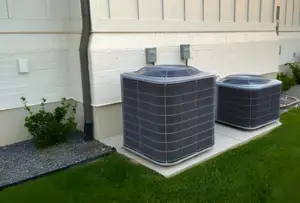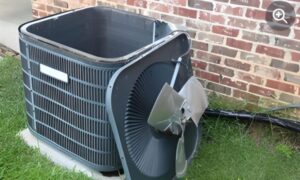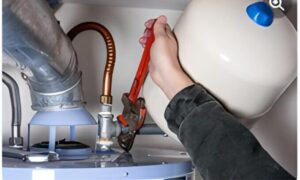Unpleasant odors coming from your air conditioning (AC) system can be a cause for concern, as they often indicate underlying issues that need to be addressed promptly. Fortunately, there are expert solutions available to eliminate these musty AC smells and restore a fresh and clean indoor environment.
In this discussion, we will explore the common causes of these odors, such as moisture, mildew, dust, and grime in HVAC ducts, as well as moisture accumulation in through-the-wall AC units and poorly ventilated areas with water leaks.
By understanding the causes and implementing expert solutions, you can effectively eliminate these musty AC smells and create a pleasant and comfortable environment for everyone.
So, let's dive into the details and discover how to tackle this issue head-on.
Causes of Musty Smell in AC
The presence of a musty smell in an AC system can be attributed to various factors.
Firstly, moisture and mildew can develop in the system, especially in areas with high humidity. This can lead to a damp, musty odor.
Secondly, dust and grime can accumulate in the HVAC ducts over time. This can create a breeding ground for mold and bacteria, resulting in a musty smell.
Additionally, through-the-wall AC units can accumulate moisture, especially if they are not properly sealed or insulated. This moisture can lead to the growth of mold and mildew, causing a musty odor.
Lastly, poorly ventilated areas with water leaks can create a stagnant environment that promotes the growth of mold and mildew, leading to a musty smell.
It is important to address these causes in order to eliminate the musty smell in an AC system.
Steps to Get Rid of AC Smells
To effectively eliminate musty smells in an AC system, a series of steps can be taken to address the root causes and ensure optimal air quality.
- Have the AC system inspected and cleaned by a professional HVAC technician. This will help identify any underlying issues and provide a thorough cleaning to remove any accumulated dirt, dust, or mold.
- Regular maintenance is crucial to prevent future issues. Residential systems should be maintained at least once a year, while commercial systems may require more frequent maintenance. Consider contacting experts for an estimate on maintenance agreements to ensure regular upkeep.
- Cleaning HVAC ducts is essential as the musty smell may come from the ducts themselves. An HVAC technician can inspect the ducts for moisture and mold growth, and if necessary, duct cleaning experts can clean and sanitize them to improve indoor air quality.
- Repairing water leaks and adjusting airflow is another important step. Look for water leaks outside of equipment and ducts and repair them promptly. Proper ventilation and HVAC design can help manage airflow and prevent odors. Consult with an HVAC technician for potential solutions such as relocating ductwork or adding ventilation.
Cleaning HVAC Ducts
Cleaning HVAC ducts is an essential step in eliminating musty smells in an AC system and improving indoor air quality. Musty smells can often originate from dust and grime that accumulates in the HVAC ducts. To address this issue, it is recommended to have an HVAC technician inspect the ducts for moisture and mold growth. If necessary, duct cleaning experts can clean and sanitize the ducts to remove any contaminants.
Duct cleaning not only eliminates the musty smell but also improves the overall indoor air quality by removing allergens, dust, and other pollutants. It is important to note that regular maintenance and cleaning of HVAC ducts are crucial to prevent the recurrence of musty smells and maintain a healthy indoor environment.
Repairing Water Leaks and Adjusting Airflow
Repairing water leaks and adjusting airflow are crucial steps in eliminating musty smells and improving the overall performance of an AC system. Here are four important actions to take:
- Identify and repair water leaks: Water leaks can lead to moisture buildup, which promotes the growth of mold and mildew. Inspect the equipment and ducts for any signs of leaks and promptly repair them to prevent further moisture accumulation.
- Manage airflow: Airflow plays a significant role in spreading odors through the ducts. Proper ventilation and HVAC design can help control the airflow and prevent the circulation of musty smells. Consult with an HVAC technician to explore solutions such as adjusting ductwork or adding ventilation where necessary.
- Optimize ventilation: Inadequate ventilation can contribute to the development of odors. Ensure that the AC system is properly ventilated to promote air circulation and prevent stagnant air that can lead to musty smells.
- Seek professional assistance: For complex issues related to water leaks and airflow adjustments, it is recommended to consult with an HVAC technician who has expertise in resolving these specific problems.
Benefits of Duct Cleaning
Duct cleaning offers numerous benefits for maintaining optimal indoor air quality and improving the overall performance of an HVAC system.
Over time, dust, dirt, and other contaminants can accumulate in the ductwork, leading to reduced airflow and potential health issues. By cleaning the ducts, these contaminants are removed, allowing for better airflow and reducing the risk of allergens and pollutants circulating throughout the space.
Additionally, clean ducts can help prevent the growth of mold and bacteria, which can thrive in moist environments. This not only improves indoor air quality but also reduces the chances of respiratory issues.
Furthermore, by improving airflow, duct cleaning can enhance the efficiency of the HVAC system, resulting in lower energy consumption and potentially reducing utility costs.
Preventive Maintenance Agreements
Preventive maintenance agreements are essential for ensuring the long-term performance and efficiency of HVAC systems. By entering into a maintenance agreement with a professional HVAC company, you can enjoy the following benefits:
- Regular inspections and tune-ups: With a preventive maintenance agreement, your HVAC system will receive regular inspections and tune-ups to identify and address any potential issues before they become major problems. This helps to prevent musty smells from developing in the first place.
- Priority service: In the event of a breakdown or emergency, preventive maintenance agreement holders often receive priority service, ensuring that any issues with the system are resolved quickly and efficiently.
- Extended equipment lifespan: Regular maintenance helps to keep your HVAC system running smoothly, which can extend its lifespan and save you money on costly repairs or replacements.
- Improved energy efficiency: Regular maintenance ensures that your HVAC system is running at optimal efficiency, which can help to reduce energy consumption and lower your utility bills.
Commercial Air Conditioning
Commercial air conditioning systems are designed to provide efficient and reliable cooling solutions for large-scale commercial buildings and spaces. These systems are specifically engineered to handle the cooling needs of commercial establishments, which often have higher heat loads compared to residential buildings.
Commercial air conditioning units are typically larger in size and have higher cooling capacities to cater to the larger spaces they serve. They are also equipped with advanced features such as variable-speed compressors, multiple cooling zones, and energy management controls to ensure optimal performance and energy efficiency.
Additionally, commercial air conditioning systems require regular maintenance and inspections to ensure proper functioning and to prevent issues such as musty smells. It is recommended to consult with HVAC professionals who specialize in commercial systems to address any concerns and ensure the long-term performance of these systems.
Residential HVAC
Residential HVAC systems play a crucial role in maintaining optimal indoor comfort and air quality for homes, ensuring that households are free from musty smells and other potential issues. To address musty AC smells in residential settings, homeowners can take the following steps:
- Have the AC system inspected and cleaned by a professional HVAC technician to identify any underlying issues and eliminate the source of the smell.
- Regular maintenance is essential to prevent issues and maintain the efficiency of the system. Residential HVAC systems should be maintained at least once a year.
- Consider contacting experts to inquire about maintenance agreements, which can provide regular inspections and maintenance to keep the system running smoothly.
- Cleaning the HVAC ducts is important as musty smells can originate from there. HVAC technicians can inspect the ducts for moisture and mold growth, and duct cleaning experts can clean and sanitize the ducts if necessary, improving indoor air quality.
Frequently Asked Questions
How Long Does It Take for a Musty Smell to Develop in an AC Unit?
The length of time it takes for a musty smell to develop in an AC unit can vary depending on several factors, such as humidity levels, ventilation, and maintenance. It is best to have the unit inspected by a professional HVAC technician to determine the specific cause and develop a solution.
Can a Musty Smell in the AC Unit Be Harmful to My Health?
A musty smell in the AC unit may not be directly harmful to health, but it can indicate the presence of mold or mildew, which can cause respiratory issues. It is important to address the issue promptly to ensure a healthy indoor environment.
Are There Any DIY Methods to Eliminate Musty AC Smells?
While there are DIY methods to temporarily mask musty AC smells, such as using air fresheners or cleaning the air filters, it is recommended to consult with a professional HVAC technician for a long-term solution.
How Often Should I Clean and Sanitize My HVAC Ducts?
To ensure optimal indoor air quality, HVAC ducts should be inspected and cleaned by a professional at least once a year. However, the frequency may vary depending on factors such as location, usage, and the presence of any musty smells.
Can a Musty AC Smell Be a Sign of a More Serious Problem With the HVAC System?
A musty AC smell can potentially indicate a more serious problem with the HVAC system. It may be a sign of moisture and mold growth, water leaks, or poor ventilation. Consult with a professional HVAC technician for proper diagnosis and solutions.
Conclusion
In conclusion, addressing and eliminating musty AC smells requires understanding the potential causes and implementing expert solutions. By having the AC system inspected and cleaned by a professional HVAC technician, regularly maintaining the system, and cleaning HVAC ducts, individuals can effectively eliminate musty AC smells and create a fresh and comfortable indoor environment.
Preventive measures, such as repairing water leaks and adjusting airflow, can also contribute to resolving odor-related problems. Overall, a proactive approach to AC maintenance is crucial for preventing future odor issues.








